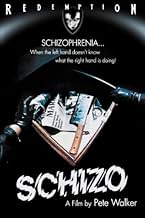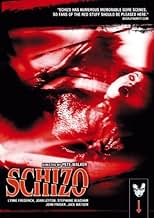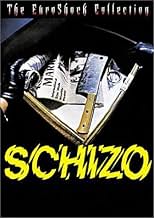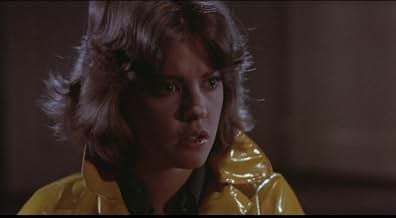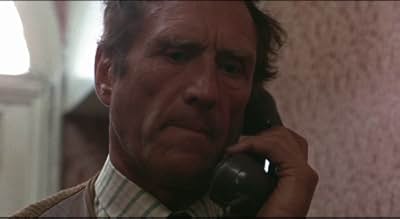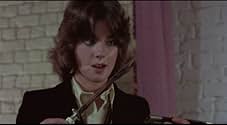AVALIAÇÃO DA IMDb
5,7/10
1,6 mil
SUA AVALIAÇÃO
Adicionar um enredo no seu idiomaA newly-married woman becomes convinced someone from her past is stalking her, but nobody believes her until the bodies start to pile up.A newly-married woman becomes convinced someone from her past is stalking her, but nobody believes her until the bodies start to pile up.A newly-married woman becomes convinced someone from her past is stalking her, but nobody believes her until the bodies start to pile up.
- Direção
- Roteiristas
- Artistas
- Direção
- Roteiristas
- Elenco e equipe completos
- Produção, bilheteria e muito mais no IMDbPro
Avaliações em destaque
SCHIZO
Aspect ratio: 1.85:1
Sound format: Mono
A young figure skater (Lynne Frederick) is stalked by a convicted killer (Jack Watson), recently paroled from prison, whose appearance coincides with a series of vicious murders.
Typical entry from British sleaze specialist Pete Walker (FRIGHTMARE), taking its cue from the giallo shockers popular throughout continental Europe at the time. Less confrontational than some of Walker's previous outings ("It was less Gothique... I wanted less incident and outrage," he explained to journalist Alan Jones in 1983), SCHIZO still delivers the gory goods, though it takes rather too long to work up a decent head of steam. Climactic dividends are reaped by a steady accumulation of narrative details, but individual scenes are somewhat labored, not helped by Frederick's lack of presence in the leading role. By contrast, Stephanie Beacham (DRACULA A.D. 1972) is utterly charming as a family friend who turns detective when Frederick identifies Watson as her stalker - had the roles been reversed, this could have been a small masterpiece of psychological horror. Other stand-outs include veteran character actor Watson (recognizable from brief appearances in countless British movies, here given a much weightier role than usual), and a bearded John Fraser ("The Trials of Oscar Wilde") as a psychiatrist who pays the price for digging too deeply into the circumstances surrounding the death of Frederick's mother.
Aware of his own directorial limitations, Walker always allowed clever scriptwork to dictate his method, but he was no hack, as SCHIZO ably demonstrates. Here, his point-and-shoot style is punctuated by moments of genuine visual dexterity, such as the circling of a pen on a newspaper article which gives way (via dissolve) to a spinning ice-skater, or the truly unsettling séance during which medium Trisha Mortimer manifests physical signs of possession by one of the killer's former victims. The subsequent murders are blunt and bloody, with no pretence to subtlety. Peter Jessop's artful cinematography and Chris Burke's sensitive art direction make a virtue of the film's seedy locations, and while a good fifteen minutes could have been cut from the overlong narrative (most of the film's highlights are confined to the second half), editor Alan Brett manages to streamline an increasingly complicated scenario with some degree of panache.
Screenwriter David McGillivray parted company with Walker after this one, due partly to the quality of the script (based on an old work by Murray Smith, author of Walker's earlier films), which McGillivray felt was too transparent, and rendered the killer's identity obvious from the outset. Maybe so, but some of the climactic revelations still pack a hell of a punch. Bottom line: If you're a fan of Walker's output or British exploitation in general, you'll overlook the film's slow-burning tempo and enjoy its outlandish plot developments. Worth a look.
Aspect ratio: 1.85:1
Sound format: Mono
A young figure skater (Lynne Frederick) is stalked by a convicted killer (Jack Watson), recently paroled from prison, whose appearance coincides with a series of vicious murders.
Typical entry from British sleaze specialist Pete Walker (FRIGHTMARE), taking its cue from the giallo shockers popular throughout continental Europe at the time. Less confrontational than some of Walker's previous outings ("It was less Gothique... I wanted less incident and outrage," he explained to journalist Alan Jones in 1983), SCHIZO still delivers the gory goods, though it takes rather too long to work up a decent head of steam. Climactic dividends are reaped by a steady accumulation of narrative details, but individual scenes are somewhat labored, not helped by Frederick's lack of presence in the leading role. By contrast, Stephanie Beacham (DRACULA A.D. 1972) is utterly charming as a family friend who turns detective when Frederick identifies Watson as her stalker - had the roles been reversed, this could have been a small masterpiece of psychological horror. Other stand-outs include veteran character actor Watson (recognizable from brief appearances in countless British movies, here given a much weightier role than usual), and a bearded John Fraser ("The Trials of Oscar Wilde") as a psychiatrist who pays the price for digging too deeply into the circumstances surrounding the death of Frederick's mother.
Aware of his own directorial limitations, Walker always allowed clever scriptwork to dictate his method, but he was no hack, as SCHIZO ably demonstrates. Here, his point-and-shoot style is punctuated by moments of genuine visual dexterity, such as the circling of a pen on a newspaper article which gives way (via dissolve) to a spinning ice-skater, or the truly unsettling séance during which medium Trisha Mortimer manifests physical signs of possession by one of the killer's former victims. The subsequent murders are blunt and bloody, with no pretence to subtlety. Peter Jessop's artful cinematography and Chris Burke's sensitive art direction make a virtue of the film's seedy locations, and while a good fifteen minutes could have been cut from the overlong narrative (most of the film's highlights are confined to the second half), editor Alan Brett manages to streamline an increasingly complicated scenario with some degree of panache.
Screenwriter David McGillivray parted company with Walker after this one, due partly to the quality of the script (based on an old work by Murray Smith, author of Walker's earlier films), which McGillivray felt was too transparent, and rendered the killer's identity obvious from the outset. Maybe so, but some of the climactic revelations still pack a hell of a punch. Bottom line: If you're a fan of Walker's output or British exploitation in general, you'll overlook the film's slow-burning tempo and enjoy its outlandish plot developments. Worth a look.
Not really prime Pete Walker; rather an attempt by the director to do a stalker / slasher picture, after the Italian giallo fashion.
Walker does treat us to some surprising and vivid scenes, ample shock moments and a fine use of locations - mid-70s Britain is once again a fascinatingly grim locale, as in some many films of the era! However, the crucial 'twist' is rather poor, straining all credibility that the film had.
The uncannily ubiquitous Jack Watson is actually quite sinister though, and Stephanie Beacham once more plays the very middle-class friend type as in other British horrors of the era. Lynne Frederick - to be wed to Peter Sellers the following year - is another of PW's sexy heroine-in-peril leads and, like many such characters, is not incapable or entirely cardboard. John Leyton, singer of the stupendously eerie Joe Meek-produced #1 hit 'Johnny Remember Me' (1961), is bizarrely cast as Frederick's husband, providing as much screen presence as the elusive Zeppo Marx. Sheila Keith is missing.
While this is a definite retreat from PW's previous nasty fairy tales - "House of Whipcord", - it still has a certain appeal for those who don't mind a bit of well-crafted 1970s exploitation. Those who view films purely in terms of gender politics should obviously stay well clear!
Walker does treat us to some surprising and vivid scenes, ample shock moments and a fine use of locations - mid-70s Britain is once again a fascinatingly grim locale, as in some many films of the era! However, the crucial 'twist' is rather poor, straining all credibility that the film had.
The uncannily ubiquitous Jack Watson is actually quite sinister though, and Stephanie Beacham once more plays the very middle-class friend type as in other British horrors of the era. Lynne Frederick - to be wed to Peter Sellers the following year - is another of PW's sexy heroine-in-peril leads and, like many such characters, is not incapable or entirely cardboard. John Leyton, singer of the stupendously eerie Joe Meek-produced #1 hit 'Johnny Remember Me' (1961), is bizarrely cast as Frederick's husband, providing as much screen presence as the elusive Zeppo Marx. Sheila Keith is missing.
While this is a definite retreat from PW's previous nasty fairy tales - "House of Whipcord", - it still has a certain appeal for those who don't mind a bit of well-crafted 1970s exploitation. Those who view films purely in terms of gender politics should obviously stay well clear!
Walker made some good horror films in the seventies. Written by the ubiquitous McGillivray. It throws in everything but the kitchen sink. Mind you the really shock of the film is Jack Watson in a ginger syrup.
British cult film-maker Pete Walker's "Schizo" is quite a blunt, if nastily grimy little psycho shocker (with giallo touches) that doesn't provide much in the way of story surprises, but cements a growing sense of unease that's broken up by constant its unpleasantness.
Samantha is an international ice-skater who's about to marry. This should be a happy time in her life; however she gets the feeling that someone is stalking her. Someone from her past, she would like to forget about. However that's hard to do when dead bodies start piling up and she believes it to be the man that slashed her mother to death, but no one seems to believe her.
The ensemble cast bestows some strong performances, especially in its support with standouts like the gorgeous Stephanie Beacham and a cynical John Frazer. Even Jack Watson had a creepy presence about him. A sound turn by Lynne Frederick in the lead covering a neurotic side and John Leyton is acceptable as her husband. Walker sturdily strings together the taut set-pieces with his leering, but expressive camera-work. The narrative keeps everything rather shady, building an edgy psychological imprint with its stalk and slash structure. The script stays interesting (despite never being too revealing) and playing around with a sense of paranoia (stress used as an excuse), but the red herrings are too obvious to be effective, so when it comes to the double whammy it doesn't pack much of a blow or is particularly credible. Stanley Myers' unhinged music score is jaunty, but extremely haunting and disorienting in its spells.
Nice cover artwork on the VHS case, but it does give a subtle clue to where the story might just head.
Samantha is an international ice-skater who's about to marry. This should be a happy time in her life; however she gets the feeling that someone is stalking her. Someone from her past, she would like to forget about. However that's hard to do when dead bodies start piling up and she believes it to be the man that slashed her mother to death, but no one seems to believe her.
The ensemble cast bestows some strong performances, especially in its support with standouts like the gorgeous Stephanie Beacham and a cynical John Frazer. Even Jack Watson had a creepy presence about him. A sound turn by Lynne Frederick in the lead covering a neurotic side and John Leyton is acceptable as her husband. Walker sturdily strings together the taut set-pieces with his leering, but expressive camera-work. The narrative keeps everything rather shady, building an edgy psychological imprint with its stalk and slash structure. The script stays interesting (despite never being too revealing) and playing around with a sense of paranoia (stress used as an excuse), but the red herrings are too obvious to be effective, so when it comes to the double whammy it doesn't pack much of a blow or is particularly credible. Stanley Myers' unhinged music score is jaunty, but extremely haunting and disorienting in its spells.
Nice cover artwork on the VHS case, but it does give a subtle clue to where the story might just head.
Pete Walker's "Schizo" is a commendable take on the at the time yet to be defined stalker/slasher genre and it even has some Giallo undertones. But sadly, the film itself isn't anything too exciting. Samantha is a successful ice skater and she's getting married. After the marriage, the trouble begins as she's being followed & stalked by a strange person from her own past. Soon enough dead bodies - all friends and acquaintances of Samantha - start popping up everywhere. Walker brings his own style to the picture, presenting us a handful of gruesome killings and some female nudity along the side. But his directing efforts can't help a screenplay that's too talkative for its own good and a plot that's simply too predictable. The ending is satisfactory, so "Schizo" surely isn't a waste of time for true fans of the genre.
Você sabia?
- CuriosidadesLynne Frederick supplied some of her own wardrobe for this film due to its very low budget.
- Erros de gravaçãoIn the introductory voice over, schizophrenia is likened to multiple personality disorder (or dissociative identity disorder). In reality, these are two entirely different ailments, one being a disruption in a person's perception of reality (schizophrenia) and the other a disconnect between more than one personality state (DID).
- Versões alternativasThe original UK cinema version was cut by the BBFC to edit the stabbing of a naked woman during the flashback scene. However additional cuts were made (totalling 1 min 3 secs) for the video release with further edits to the same scene plus cuts to the hammer murder, a sex scene and the stabbing of Mrs Wallace through the head with a knitting needle. The 2008 Redemption DVD is fully uncut.
- ConexõesFeatured in My Sweet Schizo (2012)
Principais escolhas
Faça login para avaliar e ver a lista de recomendações personalizadas
- How long is Schizo?Fornecido pela Alexa
Detalhes
Contribua para esta página
Sugerir uma alteração ou adicionar conteúdo ausente

Principal brecha
By what name was Demência Sinistra (1976) officially released in India in English?
Responda

